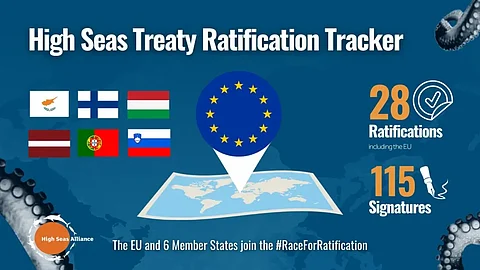

60 ratifications from individual countries are needed for the treaty to enter into force.
Image: High Seas Alliance.
The European Union, together with 6 EU member states, have formally ratified "Biodiversity Beyond National Jurisdiction" (BBNJ) Agreement - also known as the High Seas Treaty - at UN Headquarters in New York this week.
This marks a total of 8 EU countries that have so far ratified the treaty, with Cyprus, Finland, Hungary, Latvia, Portugal and Slovenia now joining Spain and France, who already ratified in February 2025. The remaining EU Member States are expected to ratify in the coming months, according to the NGO High Seas Alliance.
The BBNJ Agreement is a legally binding international treaty under the United Nations Convention on the Law of the Sea (UNCLOS), seeking to protect ocean ecosystems, address environmental degradation, fight climate change, and halt biodiversity loss. The BBNJ is seen as an essential pillar for achieving the Kunming-Montreal Global Biodiversity Framework target of protecting at least 30% of the ocean by 2030 and promoting fair benefit-sharing from marine genetic resources.
To date, the treaty, originally adopted in June 2023, has secured 115 countries as signatories, and 28 ratifications have been made out of the total of 60 needed for the legislation to enter into force.
The EU's ratification does not count officially towards this total since it is a multi-country entity and thus its individual member states have to each individually ratify the treaty.
However, the bloc's ratification, timed to take place in advance of the UN Ocean Conference soon to take place in Nice, France, has been welcomed as sign of leadership and commitment on behalf of Europe.
In April, the European Commission also proposed a new directive to integrate the agreement into European Union law, including establishing large-scale marine protected areas in international waters and ensuring mandatory environmental impact assessments before activities can be approved. The directive on the BBNJ also comes at a time when the EC is developing its forthcoming European Ocean Pact, aimed at advancing sustainable ocean management.
“This boost in ratifications by the EU and its member states is a powerful acceleration toward the Treaty’s entry into force - just days before a major international ocean conference in Nice, France,” said Nathalie Rey, European Regional Coordinator for High Seas Alliance, via a press release.
“EU leadership is essential in confronting the biodiversity and climate crises. This bold move sends a clear message that ocean protection is not optional - it’s a global priority. We urge the remaining EU countries and others to swiftly follow suit," she added.
A special High Seas Treaty event has been scheduled for 9 June 2025 during the UN Ocean Conference, where further countries are expected to deposit their instruments of ratification, the High Seas Alliance said.
